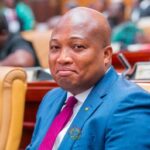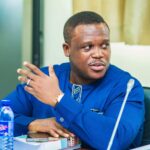
A legal expert, Dr Raymond Atuguba, has pulled stitches out of the government’s proposed Office of Independent/Special Prosecutor, describing it as an illegality that will not pass the test in the Supreme Court if Parliament goes ahead to pass the Bill into law.
In a fiery delivery of his opposition to the Bill, the law lecturer said the office was null and [ads1]void in the absence of a constitutional amendment.
“Under our current constitutional dispensation, no prosecutor in Ghana can be legally independent. Again, under our current constitutional dispensation, no prosecutor can be legally special.
“Any attempt to pass a law that establishes the Office of the Prosecutor that purports to be special or independent does not only do violent to Article 88 of the Constitution but will not pass constitutional master in the Supreme Court,” he said at a public forum on parliamentary oversight and good governance in Accra last Wednesday.
Forum
The forum was organised by the Centre for Social Democracy (CSD-Ghana) in partnership with the Political Science Department of the University of Ghana with support from Friedrich Ebert Stiftung (FES).
It was to critically examine the oversight function of Parliament within the context of promoting good governance, as well as key factors that hinder the effective performance of these functions. It was also to make recommendations on how Parliament can be more effective in promoting good governance.
Wrong path
Going into what made the independent special prosecutor unconstitutional, Dr Atuguba, who served as former President Mahama’s Executive Secretary, said Parliament was allowing the Executive to take the country on a wrong path as the nation sought to right the wrongs of corruption.
The government is counting on the Office of the Special Prosector as a specialised agency to investigate specific cases of corruption involving public officers and politically exposed persons in the performance of their functions, as well as persons in the private sector implicated in the commission of corruption.
Hitting a snag
A Bill to that effect was sent to Parliament but hit a snag as the House determined through the recommendations of the Committee on Constitutional, Legal and Parliamentary Affairs that the Bill for its establishment was not of urgent nature.
The committee recommended that the Special Prosecutor Bill, 2017 be taken through the usual legal legislative procedure.
That procedure would involve stakeholder consultation, preparation and presentation of a report to Parliament, second reading, amendments to provisions in the Bill, third reading before passing it.
Financial loss
But Dr Atuguba said Parliament must be bold enough to tell the Executive that wasting time and resources on backing a bill that would be dead on arrival amounted to causing financial loss to the state.
“Every prosecutor in Ghana is within the meaning of Article 88 of the 1992 Constitution under the prosecutorial discretion, direction and control of the Attorney-General.Such a prosecutor is dependent on the Attorney-General and can never be independent.
Article 88(1) stipulates that there shall be an Attorney-General of Ghana who shall be a Minister of State and the principal legal adviser to the government. Clause (3) further states that the Attorney-General shall be responsible for the initiative and conduct of the prosecutions of criminal offences.
Drawing from that, he said every prosecutor in Ghana was given a charter by the A-G who had over the years vested the power in institutions including Forestry Commission, Social Security and National Insurance Trust (SSNIT) and the Northern Electricity Company (NEDCo.)
He argued that “The so-called independent prosecutor is dependent and ordinary. The 1992 Constitution is the fundamental law of the land. That law has vested all the prosecutorial powers in the Attorney-General.”
Dr Atuguba noted that Parliament itself was constitutionally constrained from giving prosecutorial powers to an independent special prosecutor, arguing that “It cannot do that. Those powers have already been vested in the Attorney-General.”
He, therefore, called on Mr Osei Kyei-Mensah-Bonsu, the Minister of Parliamentary Affairs, who also doubles as Majority Leader, to stop the bill from coming back to Parliament.
He, however, commended the legislators for sending the bill back to where it came from, insisting that it would be a fruitless effort.
Rubber stamp?
Ghana’s Parliament has often been described by political connoisseurs as a rubber- stamp institution for laws, policies and programmes emanating from the Executive without the spine to hold the Executive to account.
The Constitutional injunction on the President under Article 78 of the 1992 Constitution to appoint the majority of ministers has also been cited by experts as crippling as Members of Parliament either become appendages to the Executive or behave in a manner that would catch the President’s eye to be appointed.
Weak committees
Speaking to those observations, the Majority Leader agreed with that appointing ministers from Parliament affected the work of the House and added that the system dealt mortal wound to the committees of Parliament.
“We have a situation where the President would take his crème from Parliament. Some people say the remnants, I would not say so, are made the chairs of committees.
“That situation inflicts a mortal wound on the committees because the committee chairs are powerful and set the agenda. If we take them as collective and all of them are ruling party members, then from the word go, it weakens the performance of Parliament,” he said.
He said by far, the most structured method of oversight of the Executive was the parliamentary committees, explaining that Parliament was as strong as its committees.
He argued that unlike in established democracies where the chairmanship of committees were shared among the parties in Parliament, in Ghana, apart from the Public Accounts Committee (PAC) which was by statute headed by the minority party and Subsidiary Legislation Committee by convention, all other committees were headed by the Majority.
He said the practice in Ghana’s Parliament was wrong as the function of overseeing the Executive was on Parliament and more so a strong opposition.










